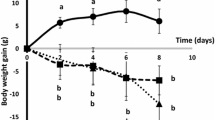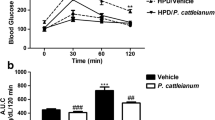Abstract
This study was designed to evaluate the effect of the oral administration of fruit extracts (lemon and Japanese apricot) combined with red-ginseng on the endurance and availability of metabolic substrates in ICR mice. Administration of the fruit extracts and red-ginseng (RG) (1:1) significantly increased swimming capacity, by 40%, with increased expenditures of non-esterified fatty acids and triglycerides in the plasma of the mice after 1 week of feeding. There was no significant increase in swimming capacity with the fruit extract alone. These results suggest that the fruit extract could synergistically elevate the effects of red-ginseng on swimming capacity in the mice by increasing fat utilization and reducing the consumption of stored glucose.
Similar content being viewed by others
References
Nocerino E, Amato M, Izzo AA. The aphrodisiac and adaptogenic properties of ginseng. Fitoterapia 71: S1–S5 (2000)
Fushiki T, Matsumoto K, Inoue K, Kawada T, Sugimoto E. Swimming endurance capacity is increases by chronic consumption of medium-chain triglycerides. J. Nutr. 125: 531–539 (1995)
Kim KM, Kawada T, Ishihara K, Inoue K, Fushiki T. Swimming capacity of mice is increased by oral administration of a nonpungent capsaicin analog, stearoyl vanillylamide. J. Nutr. 128: 1978–1983 (1998)
Tomita K, Okuhara Y, Shigematsu N, Suh H, Lim K. (−)-Hydroxycitrate ingestion increases fat oxidation during moderate intensity exercise in untrained men. Biosci. Biotech. Bioch. 67: 1999–2001 (2003)
Garland PB, Randle PJ, Newsholme EA. Citrate as an intermediary in the inhibition of phosphofructokinase in rat heart muscle by fatty acids, ketone bodies, pyruvate, diabetes, and starvation. Nature 200: 169–170 (1963)
Rennie MJ, Holloszy JO. Inhibition of glucose uptake and glycogenolysis by availability of oleate in well-oxygenated perfused skeletal muscle. Biochem. J. 168: 161–170 (1977)
Jansson E, Kaijser L. Leg citrate metabolism at rest and during exercise in relation to diet and substrate utilization in man. Acta Physiol. Scand. 122: 145–153 (1984)
Jansson E, Kaijser L. Substrate utilization and enzymes in skeletal muscle of extremely endurance-trained men. J. Appl. Physiol. 62: 999–1005 (1987)
Park TS. The annual report of Korean Food & Drug Administration, Korea 9: 467–468 (2005)
Matsumoto K, Ishihara K, Tanaka K, Inoue K, Fushiki T. An adjustable-current swimming pool for the evaluation of endurance capacity of mice. J. Appl. Physiol. 81: 1843–1849 (1996)
Bostrom S, Fahlen M, Hjalmarson A, Johansson R. Activities of rat muscle enzymes after acute exercise. Acta Physiol. Scand. 90: 544–554 (1974)
Hassid WZ, Abraham S. Chemical procedures for analysis of polysaccharides. Method. Enzymol. 3: 34–35 (1957)
Moriura T, Matsuda H, Kubo M. Pharmacological study on Agkistrodon blomhoffii Boie. V. Anti-fatigue effect of the 50% ethanol extract in acute weight-loaded forced swimming-treated rats. Biol. Pharm. Bull. 19: 62–66 (1996)
Jung K, Kim IH, Han D. Effect of medicinal plant extracts on forced swimming capacity in mice. J. Ethnopharmacol. 93: 75–81 (2004)
Ahlborg G, Felig P. Substrate utilization during prolonged exercise preceded by ingestion of glucose. Am. J. Physiol. 233: E188–E194 (1977)
Devlin JT, Calles-Escadon J, Horton ES. Effects of pre-exercise snack feeding on endurance cycle exercise. J. Appl. Physiol. 60: 980–985 (1986)
Randle PJ, Garland PB, Hales CN, Newsholme EA. The glucose fatty-acid cycle. Its role in insulin sensitivity and the metabolic disturbances of diabetes mellitus. Lancet 13: 785–789 (1963)
Coggan AR, Spina RJ, Kohrt WM, Holloszy JO. Effect of prolonged exercise on muscle citrate concentration before and after endurance training in men. Am. J. Physiol-Endoc. M. 264: E215–E220 (1993)
Author information
Authors and Affiliations
Corresponding author
Rights and permissions
About this article
Cite this article
Kim, J.H., Jung, W.S., Bae, G.S. et al. Short-term synergistic effect of fruit extracts with red-ginseng on forced swimming endurance capacity in ICR mice. Food Sci Biotechnol 19, 267–270 (2010). https://doi.org/10.1007/s10068-010-0039-5
Received:
Revised:
Accepted:
Published:
Issue Date:
DOI: https://doi.org/10.1007/s10068-010-0039-5




